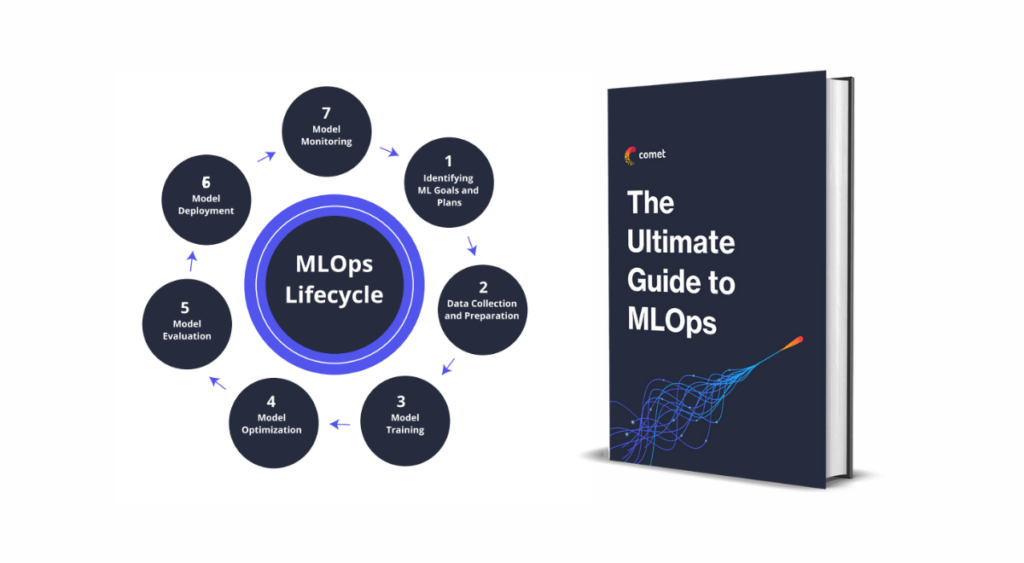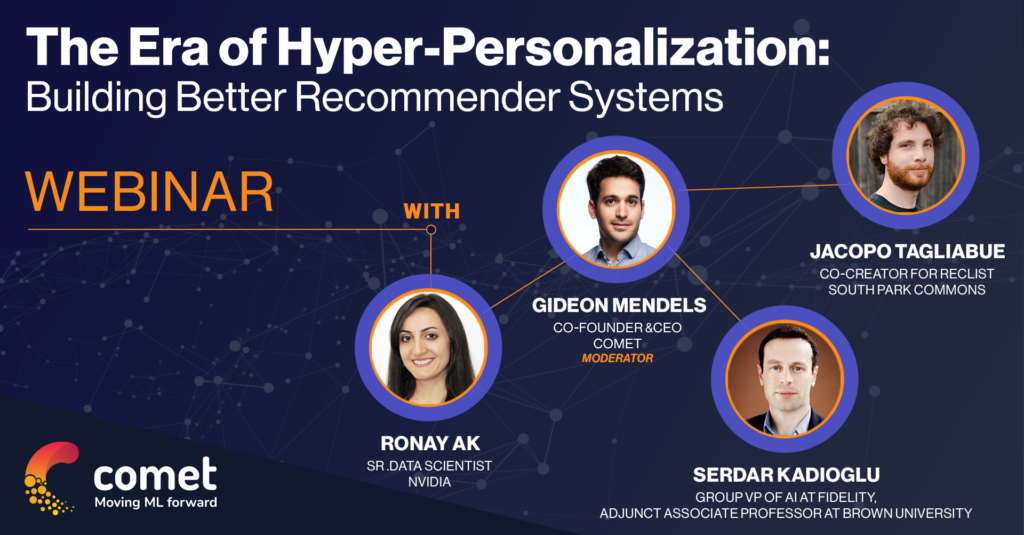Comet Resources
How to Scale Today’s Data Science Initiatives
Learn how to define your key business objectives, manage the way you scale your ML initiatives, organize your DS team, and build out your processes and infrastructure
Standardizing the ML Experimentation Process
ML industry experts have identified the process and requirements for developing production-ready machine learning models. You’ll find in this eBook that a standard approach helps to get more models in production.
Building Effective ML Teams
This eBook explains the three critical traits of successful ML teams, and the risks of missing any of these items: visibility, reproducibility, and collaboration.
The Ultimate Guide to MLOps
MLOps provides massive returns when organizations develop a robust and efficient system. Learn how to create a stronger workflow with this ultimate guide.
The Era of Hyper-Personalization: Building Better Recommender Systems
In this roundtable with Ronay Ak from Nvidia, Serdar Kadioglu at Fidelity Investments, and Jacopo Tagliabue, we will be discussing how to build better recommender systems. Our guest speakers shared many lessons learned from building and collaborating with others in building RecSys.
Industry Panel: Defining the MLOps Stack
What is MLOps? What does it means to you as a data scientist? Watch this on-demand webinar to learn to the answers to these questions and more.
Customer Roundtable: Developing ML at Enterprise Scale
In this session, join the teams at Superb AI, AI Infrastructure Alliance, and Comet as we cover: How a modular approach to the ML tech stack enables teams to choose the best tools for their use case, data, and business
Accelerating AI Value with Modular MLOps
In this session, join the teams at Superb AI, AI Infrastructure Alliance, and Comet as we cover: How a modular approach to the ML tech stack enables teams to choose the best tools for their use case, data, and business
ML System Design for Continuous Experimentation
In this webinar, we will examine some naïve ML workflows that don’t take the development-production feedback loop into account and explore why they break down.
ML in the Field featuring Vignesh Shetty of GE Healthcare
GE Healthcare projects are delivering REAL impactful business contributions, including reducing MRI imaging time by up to 50% while improving image quality, 30-50% reduction in exam time and 70% reduction in no-show rates. Listen to this in-depth interview and learn: -How large of an AI/ML team is needed for these impactful projects -What level of industry/domain expertise is needed by AI practitioners
Running Effective Machine Learning Teams
While academic research has been improving consistently, many organizations are struggling with translating ML into business value. Now is the time to strategize with your team to overcome critical operational hurdles of ML teams.
Understanding the ML Model Lifecycle
What is the machine learning lifecycle? Watch this webinar to learn: The stages of the ML model lifecycle Why it’s critical that machine learning teams track their models through the entire lifecycle
Building Your Futureproof Stack for MLOps
In this webinar, join the teams at Pachyderm and Comet as we cover: What MLOps entails, and the components of a robust stack The challenges teams face when scaling their models intro production
Lessons From the Field in Building Your MLOps Strategy
In our discussions with leading organizations utilizing ML like The RealReal and Uber, we have compiled real-world case studies and organizational best practices for MLOps in the enterprise.
Visualize your Object Detection Models with Jacques Verré
Whether you’re comparing model performance during a daily standup or onboarding a new teammate, you’ll need to log the training runs with an experiment management tool like Comet. In this session, Jacques Verré will walk you through the process of reviewing a YOLOv5 model in Comet.
2021 ML Practitioner Survey
AI is encountering another hurdle to delivering value, in the form of friction among and between teams. A survey of 508 machine learning practitioners that included data scientists and engineers found challenges related to people, process, and tools. This friction can cause delays in ML development that delay or halt model deployment to production.
Convergence 2022 – ML Highlights from 2021 and Lessons for 2022
Oren Etzioni, CEO at Allen Institute for Artificial Intelligence, was the keynote speaker at Comet’s Convergence 2022 event, where he summarizes 15 highlights of 2021 in ML and suggests lessons for 2022 and beyond.
MLOps System Design for Development and Production
Comet CEO Gideon Mendels discusses system design principles for managing development-production feedback loops and shares industry case studies these principles are applied to production ML systems.
More than a Statistic: Diversity in Data Science and Machine Learning
Diversity has become an HR catchphrase, but what does it really mean to be from an underrepresented group in tech? This webinar explores the ongoing discussions about diversity, equity, and inclusion in ML and data science.
Overcoming Machine Learning Development Challenges
In this webinar, Gideon Mendels shares the results of Comet’s 2021 ML Practitioner Survey and talks to Ancestry’s Stanley Fujimoto about overcoming ML development challenges.
Reproducibility in ML Development
Reproducibility can be a barrier to ensuring positive outcomes and scaling great work. Learn about four aspects of reproducibility in ML and a five-point checklist for ensuring ML reproducibility across your organization.
Standardizing the Experiment #3: Understanding the Data
In this report, we perform exploratory data analysis on the HackerNews dataset. Our profiling script builds visualizations, extracts summary profiles, and logs samples of the data for reference. We investigate the relationship between our initial set of features and our target.
Standardizing the Experiment #2: Baseline Models (Performance Prediction)
As part of the Standardizing the Experiment Series, we present a report on a baseline post Performance Prediction Model for the HackerNews Dataset.
Standardizing the Experiment #2: Baseline Models (Topic Model)
As part of the Standardizing the Experiment Series, we present a report on a baseline Topic Model for the HackerNews Dataset.
Standardizing the Experiment #2: Baseline Models (Sentiment Analysis)
As part of the Standardizing the Experiment Series, we present a report on a baseline Sentiment Analysis Model for the HackerNews Dataset.
Comet Tips and Tricks
Here’s a collection of tips and tricks in the Comet MLOps platform, including adding multiple metrics to a built-in chart panel, filtering experiments, setting experiments as baselines in a new project, and more.
Advanced ML: Multi-file Jobs
As the complexity of your training pipeline grows, you may find it beneficial to start modularizing code. In this report, we outline best practices for passing the Comet Experiment object between different files within a project.
Advanced ML: Parameter Optimization
A guide to using an Iterative Strategy for Hyperparameter Optimization.
Profiling Datasets
In this report we explore how to log profiles of your Pandas DataFrames, use them to assess the quality of your inputs, and identify the data constraints of your model.
Advanced ML: Parallelism
In this report we explore two of the most common methods for parallelized training in Machine Learning: Data Parallelism and Inter-Model Parallelism.
Logging Curves to Comet
Learn how to visualize your ROC and Precision-Recall Curves using Comet Reports and Panels.
Creating Panels with Vega
Learn how to build Vega visualizations directly in Comet Panels. This report will walk you through working with the Vega Visualization Grammar.
Custom Visualizations to Debug Object Detection Models
See how custom panels can help visualize predictions from Object Detection Models.
Tensorflow Model Analysis
Learn how to log Tensorflow Model Analysis (TFMA) visualizations to Comet.
Visualizations to Interpret Convolutional Neural Networks
Explore a set of techniques that help visualize filters, layers and features in Convolutional Neural Networks.

